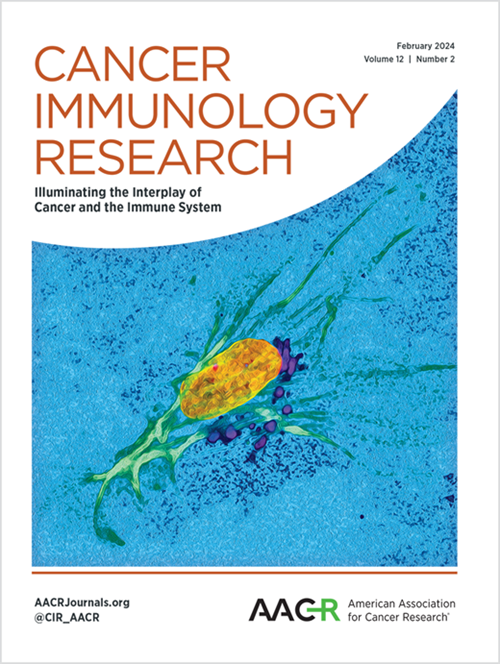异体 CAR T 细胞:复杂的细胞疗法设计考验我们临床前模型的极限。
IF 8.1
1区 医学
Q1 IMMUNOLOGY
引用次数: 0
摘要
目前美国食品及药物管理局批准的所有嵌合抗原受体(CAR)T细胞产品都是自体细胞,这给广泛应用带来了一些挑战。在本期杂志中,Degagné及其同事介绍了他们针对多发性骨髓瘤创建现成CAR T细胞的临床前研究。他们利用CRISPR/Cas12a基因组编辑平台和基因敲入技术消除异体活性,降低对自然杀伤(NK)细胞的易感性。这项工作促使现成的 CAR T 细胞用于多发性骨髓瘤治疗的 I 期试验正在进行中。参见 Degagné 等人的相关文章,第 462 页(2)。本文章由计算机程序翻译,如有差异,请以英文原文为准。
Allogeneic CAR T Cells: Complex Cellular Therapy Designs Test the Limits of Our Preclinical Models.
All chimeric antigen receptor (CAR) T-cell products currently approved by the FDA are autologous, which poses several challenges for widespread use. In this issue, Degagné and colleagues present their preclinical research on creating off-the-shelf CAR T cells for multiple myeloma. They utilized the CRISPR/Cas12a genome editing platform and gene knock-in techniques to eliminate alloreactivity and decrease susceptibility to natural killer (NK)-cell elimination. This work has led to an ongoing phase I trial of off-the-shelf CAR T cells for multiple myeloma treatment. See related article by Degagné et al., p. 462 (2).
求助全文
通过发布文献求助,成功后即可免费获取论文全文。
去求助
来源期刊

Cancer immunology research
ONCOLOGY-IMMUNOLOGY
CiteScore
15.60
自引率
1.00%
发文量
260
期刊介绍:
Cancer Immunology Research publishes exceptional original articles showcasing significant breakthroughs across the spectrum of cancer immunology. From fundamental inquiries into host-tumor interactions to developmental therapeutics, early translational studies, and comprehensive analyses of late-stage clinical trials, the journal provides a comprehensive view of the discipline. In addition to original research, the journal features reviews and opinion pieces of broad significance, fostering cross-disciplinary collaboration within the cancer research community. Serving as a premier resource for immunology knowledge in cancer research, the journal drives deeper insights into the host-tumor relationship, potent cancer treatments, and enhanced clinical outcomes.
Key areas of interest include endogenous antitumor immunity, tumor-promoting inflammation, cancer antigens, vaccines, antibodies, cellular therapy, cytokines, immune regulation, immune suppression, immunomodulatory effects of cancer treatment, emerging technologies, and insightful clinical investigations with immunological implications.
 求助内容:
求助内容: 应助结果提醒方式:
应助结果提醒方式:


